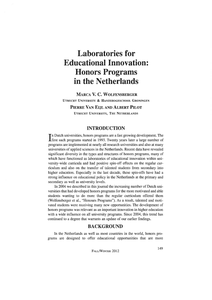According to the Dutch Ministry of Education ten percent of all students in higher education have to participate in a program that promotes excellence by 2014. This as the utterance of the ambition of the government and business to be part of the top five world knowledge economies. In this explorative survey research fulltime students of the School of Social Studies of the Hanze University of Applied Sciences (N = 1918) are being questioned about their attitudes toward exceeding in education by participating in honors programs. The survey contains a combination of statements based on ‘The Excellence Model’ by Platform Bèta Techniek, Youngworks and Motivaction and the different types of honors education at the School of Social Studies of the Hanze University of Applied Sciences.
DOCUMENT
The Spring of 2020 brought many disruptions to our professional and personal lives due to the COVID-19 pandemic that forced worldwide mid-semester campus closures; pivoting of traditional, face-to-face classes to remote teaching and learning; and postponements or cancellations of conferences, workshops, and other professional development events. One example of the breakdown of scheduled opportunities for us as honors colleagues to gather in-person to enhance our practices and strengthen our community was the cancellation of the 2020 International Conference on Talent Development and Honors Education in Groningen, the Netherlands, originally slated for June 10-12 but moved to June 16-18, 2021. Immediately following the 2020 conference, we (the authors) had planned to offer the fifth Honors International Faculty Institute (HIFI), an international and highly interactive occasion for honors and talent development teachers, researchers, and leaders to engage in presentations, experiential activities, place-as-text explorations, collaborative group work, reflective exercises, and showcases designed to improve teaching, learning, and programming in honors. Suddenly, the coronavirus upended our world, and we had to reimagine the institute that we had previously organized four times alternately at Hanze University of Applied Sciences (Netherlands) and Texas Christian University (USA). Putting aside the disappointment of the moment and recognizing the value of coming up with an alternative to HIFI that would ensure the safety and health of our honors colleagues, we decided to create a fully online version with free registration to encourage participation and create resources accessible to all members of our international community. We wanted to highlight the challenges of how all of us unexpectedly had to pivot to remote teaching and learning as the global pandemic intensified, but we also wanted to share information, experiences, and models that could open new avenues for operationalizing online honors education more generally beyond the COVID-19 crisis. We wanted, in other words, to explore how honors pedagogy could (and maybe should) be adapted to the increasingly online world of primary, secondary, and higher education. Thus, HIFLO 2020 was born! HIFLO stands for Honours International Faculty Learning Online.
DOCUMENT
This brochure is one of the results of the research project Honors in Europe at the Research Centre forTalent Development in Higher Education and Society at Hanze University of Applied Sciences Groningen inthe Netherlands. It is based on the book Talent Development in European Higher Education – Honors programs in the Benelux, Nordic and German-speaking countries by Marca Wolfensberger, published in openaccess in 2015 at Springer Open. The book can be downloaded freely through www.honorsineurope.com.The brochure was prepared in cooperation with the European Honors Council (www.honorscouncil.eu).
DOCUMENT

One of the factors that differentiate honors from regular teaching at the Faculty of Geosciences at Utrecht University, the Netherlands, is the freedom that honors students enjoy, a freedom that evokes excellence because it is focused and targeted. This targeted freedom takes three different shapes in our honors program and comes with specific challenges for both students and teachers. While the attractions and advantages of such freedom are both theoretically and practically significant, our experience has also demonstrated drawbacks that need to be addressed and resolved in creating effective honors education.The challenges and struggles as well as the rewards that we have experienced might be familiar to honors educators around the world, but they are also shaped by the particular contexts of our program within the Faculty of Geosciences, within Utrecht University, and within the Netherlands, contexts that we will now introduce.
DOCUMENT

To help students reach their full potential, additional challenges beyond the standard curriculum may be necessary for some. In Dutch secondary vocational education, education for talented students is organized in two prevalent ways: through participation in honors programs that foster community building and through professional competitions. Given the apparent contradiction and potential tension between community building and competition, this research explores these concepts and their interplay to create optimal learning environments for talented students. A scoping review was conducted, analyzing 101 studies and identifying six overarching themes: Added Value, Characteristics & Conditions, Design & Development, Collaboration, Membership & the Role of Actors, and Enhanced Learning & the Role of Actors. Findings confirmed the benefits of both community building and competition in honors education. Despite a literature gap regarding their combination, this review provides insights into how these concepts can be merged to create enriching learning environments by synthesizing the themes.
DOCUMENT
This book examines the much-debated question of how to unleash the potential of young people with promising intellectual abilities and motivation. It looks at the increasingly important topic of excellence in education, and the shift in focus towards the provision of programs to support talented students in higher education. It provides a systematic overview of programs for talented students at northern European higher education institutions (HEIs). Starting in the Netherlands, where nearly all HEIs have developed honors programs over the past two decades, the book explores three clusters of countries: the Benelux, the Nordic and the German-speaking countries. For each of these countries, it discusses the local culture towards excellence, the structure of the education system, and the presence of honors programs. In total, the book reviews the special talent provisions for nearly four million students at 303 higher education institutions in eleven countries. In addition, it offers an analysis of the reasons to develop such programs, a look into the future of honors education and a practical list of suggestions for further research.The Sirius Program assigned Marca Wolfensberger to carry out this research.
LINK
Paper presentatie tijdens de EARLI Conference 2015, Limassol, Cypres, 28 augustus. In this line of research we take a social psychological approach to understanding how honors students position themselves when collaborating with regular students. More specifically, we explore whether stereotypes about honors students as well as inclusion goals affect the extent to which honors students adapt to group norms in terms of ambition, motivation and excellence or take a more leading role when working with regular students. Results of a small more qualitative pilot study (N = 14) show that honors students indeed tend to behave differently by either adapting to the group of regular students or by taking the lead/control. Further the main reasons provided for this are preventing disharmony and delivering high quality work. Results of a larger survey study show that honors students (N = 106) are more likely to take a leading role when they feel valued by the group in terms of competence and inclusion. Further, regular students’ (N = 729) attitude to such a role is particularly negative when they do not want to include honors students and sense that honors students do not want to be included. Results are discussed in terms of its effects on creating a culture of excellence via honors programs within higher education and provide insights in how to improve the interaction between honors and regular students.
DOCUMENT
Diese Broschüre ist das Resultat des Forschungsprojektes ‘Honors in Europe’ des Forschungszentrum fürTalententwicklung in der höheren Bildung und Gesellschaft der Hanze Universität angewandter Wissenschaften Groningen. Sie basiert auf dem Buch ‘Talent Development in European Higher Education – Honors programs in the Benelux, Nordic and German-speaking countries’ von Marca Wolfensberger, welches als open access beim Springer Verlag erschienen ist. Das Buch kann gratis heruntergeladen werden unterwww.honorsineurope.com Die Broschüre wurde in Zusammenarbeit mit dem European Honors Councilerstellt (www.honorscouncil.eu)
DOCUMENT

In de brochure ‘Aan de slag met honors’ worden onderzoeksresultaten van het onderzoeksproject Honors in Europe hertaald naar tips voor succesvol en inspirerend honorsonderwijs. De brochure is grotendeels gebaseerd op het boek Talent Development in European Higher Education – Honors programs in the Benelux, Nordic and German-speaking countries van Marca Wolfensberger van het Lectoraat Excellentie in Hoger Onderwijs en Samenleving van de Hanzehogeschool Groningen.
DOCUMENT

In Dutch universities, honors programs are a fast growing development. Thefirst such programs started in 1993. Twenty years later a large number ofprograms are implemented at nearly all research universities and also at manyuniversities of applied sciences in the Netherlands. Recent data have revealedsignificant diversity in the types and structures of honors programs, many ofwhich have functioned as laboratories of educational innovation within university-wide curricula and had positive spin-off effects on the regular curriculumand also on the transfer of talented students from secondary intohigher education. Especially in the last decade, these spin-offs have had astrong influence on educational policy in the Netherlands at the primary andsecondary as well as university levels.
DOCUMENT
